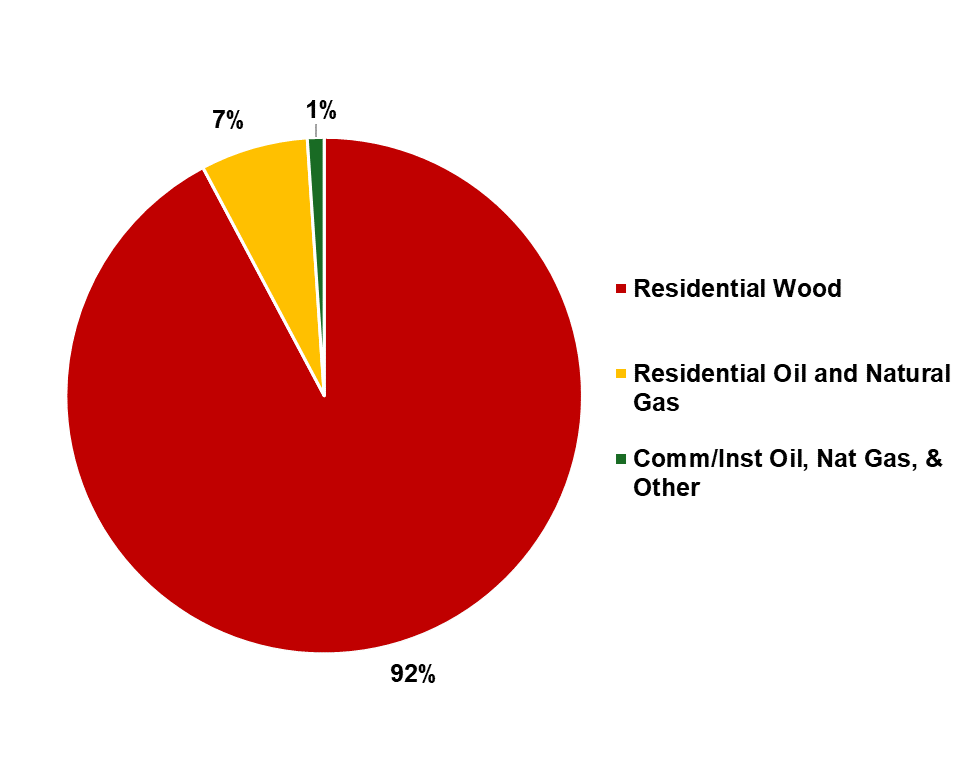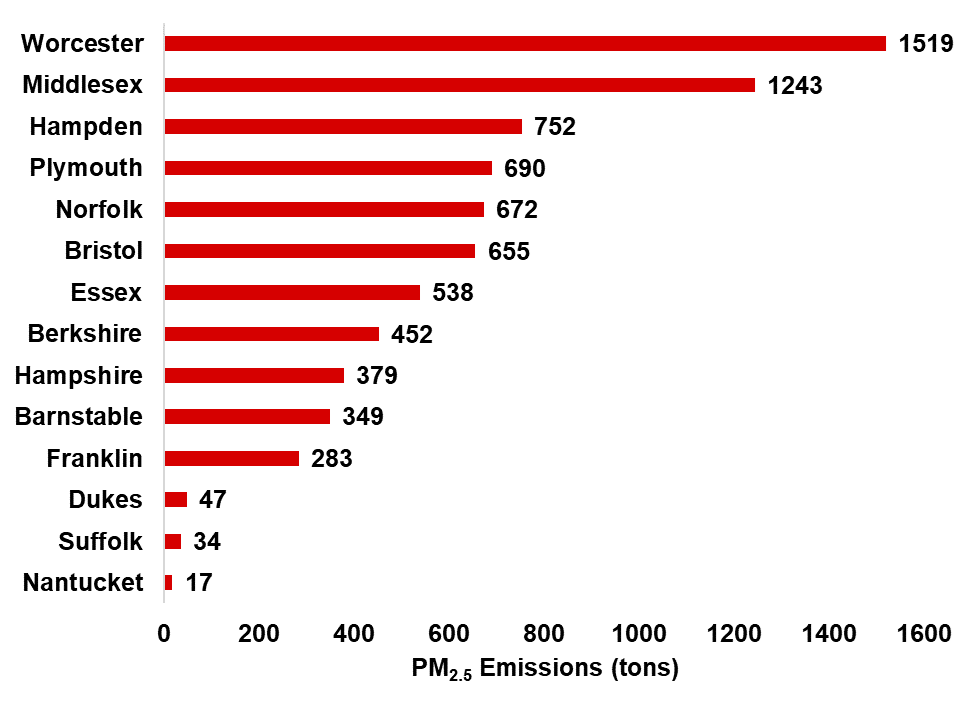Wood Heating Eclipses All Other Sources of PM2.5 Pollution in Massachusetts

Photo: PxHere.com. Public Domain
Environnmental Groups Blast Legislative Proposal to Increase “clean energy” Subsidies for Polluting Wood Heating
Wood heating is responsible for 92% of fine particulate air pollution in Massachusetts’ heating sector, and nearly a third of such emissions statewide, even though only 12% of homes in the commonwealth burn wood, according to an analysis of EPA data prepared by the Partnership for Policy Integrity (PFPI), a nonprofit research and advocacy group that focuses on clean energy policy.
Exposure to fine particulate emissions (particles that are 2.5 microns diameter or smaller, known as PM2.5) can lead to illness and premature death. PM2.5 is linked to a wide range of acute health events including asthma attacks, heart attacks, and strokes, as well as chronic conditions including cardiovascular disease, lung cancer, asthma, and increased risk of Alzheimer’s, Parkinson’s, and other neurodegenerative diseases.
PFPI’s findings are being released as the Massachusetts Legislature is advancing a bill that would increase subsidies for commercial and residential wood heating. Massachusetts’ Alternative Energy Portfolio Standard (APS) incentivizes wood furnaces and boilers through its renewable heating program. H.4503, which was referred to the House Ways & Means Committee on April 4, would give some wood-heating devices double the payments that are given to non-polluting heating technologies, such as heat pumps, geothermal systems, and solar hot water systems.
Doctors, scientists, and climate justice activists oppose increasing subsidies for wood heating:
Brita Lundberg, MD, a board member of Greater Boston Physicians for Social Responsibility, said, “Burning wood increases air pollution and pollution-related disease and creates climate-damaging greenhouse gasses at a time when scientists are telling us urgently to slash these emissions. Many deaths could be prevented by reducing air pollution levels in the Commonwealth. Why are state legislators advancing a proposal that would harm human health?”
Dr. Jacob Carter, PFPI’s staff scientist who conducted the analysis, said, “The science is clear – it is time to stop promoting wood fuel as a clean and climate friendly source of energy in the Commonwealth. Instead of spending millions of dollars to subsidize highly polluting wood-burning, Massachusetts should invest in solutions that actually reduce air pollution and greenhouse gas emissions.”
Naia Tenerowicz, a Springfield resident and member of the Springfield Climate Justice Coalition said, “People are getting sick from breathing unhealthy air, especially in environmental justice communities like Springfield which are disproportionately impacted by pollution. The government has a responsibility to protect its citizens. Our state lawmakers should be working to reduce harmful air pollution – not incentivizing programs that exacerbate our health problems and worsen the climate crisis.”
Research findings
PFPI analyzed the most recent data available from the EPA’s National Emissions Inventory (NEI) on PM2.5 emissions in Massachusetts along with other public data sources. The NEI, a comprehensive and detailed set of air pollution data, was updated with the 2020 emissions data in August 2023. In addition, burning wood releases a wide range of other emissions that are harmful to human health, including carbon monoxide, methane, volatile organic compounds (VOCs), dioxins, lead, cadmium, and arsenic, not all of which are included in the NEI.
PFPI found:
· Twelve percent of homes in Massachusetts burn wood, and 1% use it as their primary source of heating, according to data from the 2020 U.S. Energy Information Administration’s Residential Energy Consumption Survey and the U.S. Census Bureau’s 2022 American Community Survey.
· According to NEI data, residential wood heating (including wood-burning stoves, fireplaces, furnaces, and outdoor wood boilers) accounted for 92% of all PM2.5 emissions from the heating sector in Massachusetts in 2020, and 29% of the state’s total PM2.5 emissions (Fig. 1).
· Total PM2.5 emissions from residential wood burning in Massachusetts in 2020 was 7,631 tons – more than seven times the PM2.5 emissions from all the trucks and cars on the road in MA that year.
· Worcester County and Middlesex County had the highest PM2.5 emissions from residential wood-burning in the state, with 1,519 and 1,243 tons of PM2.5 respectively, released into the air in 2020. Both Worcester and Middlesex ranked among the top 20 counties in the Northeast for PM2.5 emissions from residential wood burning (Fig. 2).
Groups Call on Massachusetts Legislature to End Subsidies for Burning Wood
A broad coalition of medical professionals, scientists, advocacy groups, and concerned citizens has long urged Massachusetts to stop promoting wood burning for energy. In 2022, the Legislature removed biomass power plants from the state’s Renewable Energy Portfolio Standard.
Advocates are now campaigning to end the remaining incentives for wood-burning in Massachusetts’ clean energy laws. Last year, Sen. Adam Gomez and Rep. Orlando Ramos, both representing Springfield, introduced legislation that would dramatically scale back funding for wood heating in the APS. They also sponsored legislation to remove woody biomass power plants from qualifying as a “non-carbon emitting source” under a new greenhouse gas emissions reduction program for municipal lighting plants. These bills are still pending in the Legislature’s Joint Committee on Telecommunications, Utilities and Energy (TUE).
However, new legislation reported out of the TUE committee earlier this month would allow certain wood heating units to get twice as much money in subsidies through the APS as clean heating technologies like heat pumps or solar thermal. H.4503 would allow wood-heating units that have emissions control devices to earn double their current payments. Even with emissions controls, wood burning is highly polluting. This provision will incentivize new, polluting wood-heating systems in the commonwealth. It is also a handout to existing units that are already required to use emission control devices. In addition, H.4503 cancels a required study of the health and climate impacts of biomass energy.In March, 75 local, state and national groups sent a letter to the chairs of the TUE committee opposing these provisions and urging them to remove subsidies for woody biomass energy in proposed climate legislation. “These latest findings underscore the urgency of taking wood-burning out of Massachusetts’ clean energy incentive programs,” said PFPI’s legislative director James McCaffrey. “Together with our coalition partners, we will be reaching out to the Healey Administration and legislative leaders to share these findings and discuss measures they must take to protect the health of Massachusetts’ residents.”


More information contact:
Laura Haight, US Policy Director, lhaight@pfpi.net, 518-949-1797
Dr. Jacob Carter, Staff Scientist, jcarter@pfpi.net, 630-405-9951
